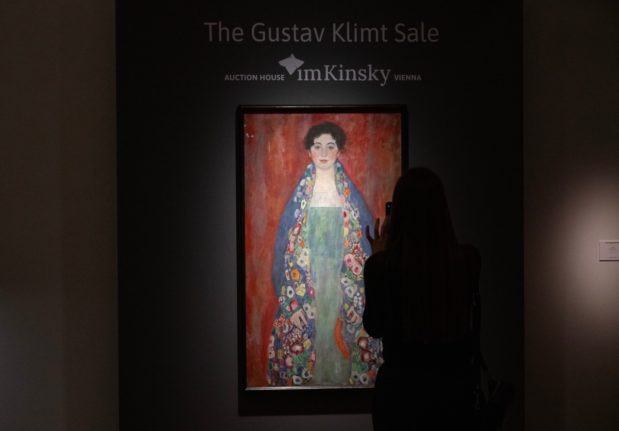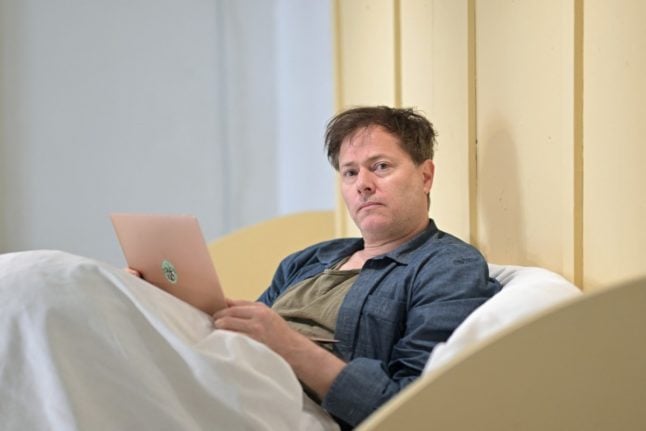“Bildnis Fraeulein Lieser” (Portrait of Miss Lieser) was commissioned by a wealthy Jewish industrialist’s family and painted by Klimt in 1917, shortly before his death.
The unfinished portrait of a dark-haired woman was likely last seen at a Viennese exhibition in 1925. It reemerged this year when auction house im Kinsky announced its sale.
“No one expected that a painting of this importance, which had disappeared for 100 years, would resurface,” said im Kinsky expert Claudia Moerth-Gasse.
Portraits by the Austrian great rarely come onto the open market.
The auction house estimates its value at 30-50 million euros ($32-53 million), but Klimt works have sold for higher prices at recent auctions.
READ ALSO: Long-lost Klimt painting resurfaced in Austria
Last June, Klimt’s “Dame mit Faecher” (Lady with a Fan) was sold in London for £74 million ($94.3 million at the time), a European art auction record.
The highest price paid at auction in Austria is a work by Flemish painter Frans Francken II, which fetched seven million euros in 2010.
Helene, Annie or Margarethe?
Wednesday’s auction will begin at 1500 GMT. Besides “Portrait of Miss Lieser”, sketches by Klimt and works by his contemporaries such as Egon Schiele will be on sale.
Ahead of the auction, the well-preserved painting has been put on show in Vienna, but also in Switzerland, Germany, Britain and Hong Kong.
The unsigned painting shows a young woman adorned with a large cape richly decorated with flowers on a bright red background.
Mystery surrounds the identity of the model, who visited Klimt’s studio nine times for the portrait.
She is known to be from the Lieser family, a Jewish industrial dynasty.
She could be one of the two daughters, named Helene and Annie, of Henriette (Lilly) Lieser, an art patron. But the first catalogue dedicated to Klimt, dating from the 1960s, said it was Lieser’s niece, Margarethe.
Lilly Lieser remained in Vienna despite the Nazi takeover, was deported in 1942 and murdered in the Auschwitz internment camp in 1943.
Nazi trader?
Before her death, Lieser seems to have entrusted the painting to a member of her staff, the Austrian daily Der Standard found based on correspondence in an Austrian museum.
It then turned up in the possession of a Nazi trader, whose daughter inherited it and who, in turn, left it to distant relatives after her death.
Im Kinsky, which specializes in restitution procedures, insists it has found no evidence that the work was stolen or unlawfully seized.
According to the auction house, the back of the painting is “completely untouched” and has “no stamps, no stickers, nothing,” which would indicate it was seized or left Austria.
READ ALSO: Austrian painting sets European record in £74 million auction
Moreover, none of the Lieser descendants who survived the war claimed the painting.
Moerth-Gasser told AFP the current owners, who wish to remain anonymous, contacted im Kinsky two years ago for legal advice. Im Kinsky then informed the Lieser families, who are largely US-based.
Some travelled to see the painting before signing an agreement with the owners, thus removing any obstacle to its sale.
Some experts have called for a more in-depth investigation of the work’s provenance however.
“Several points should be questioned more critically, as the provenance of the picture has not yet been completely clarified,” Monika Mayer, head of archives at the Belvedere museum, which houses Klimt’s famous “Kiss”, was quoted as saying by Austria’s Profil magazine.
Moreover, the painting was not presented in the United States, for fear it could be held there, as has happened before with Austrian works under dispute.
Austrian museums have returned several works of art to descendants of Jewish art collectors, including five Klimt masterpieces sought by an American claimant.
READ NEXT: 7 of the most famous Austrians in History



 Please whitelist us to continue reading.
Please whitelist us to continue reading.
Member comments